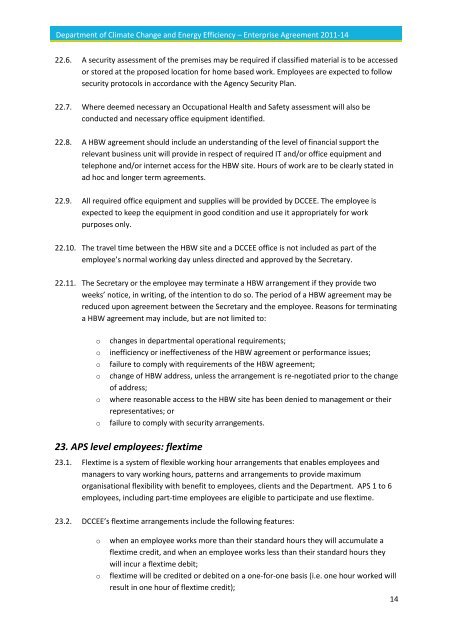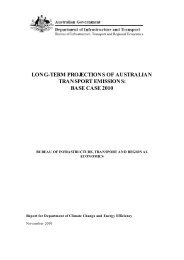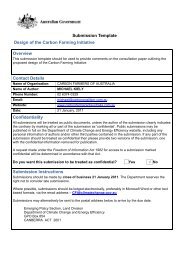Enterprise Agreement 2011-14 - Department of Climate Change
Enterprise Agreement 2011-14 - Department of Climate Change
Enterprise Agreement 2011-14 - Department of Climate Change
Create successful ePaper yourself
Turn your PDF publications into a flip-book with our unique Google optimized e-Paper software.
<strong>Department</strong> <strong>of</strong> <strong>Climate</strong> <strong>Change</strong> and Energy Efficiency – <strong>Enterprise</strong> <strong>Agreement</strong> <strong>2011</strong>-<strong>14</strong><br />
22.6. A security assessment <strong>of</strong> the premises may be required if classified material is to be accessed<br />
or stored at the proposed location for home based work. Employees are expected to follow<br />
security protocols in accordance with the Agency Security Plan.<br />
22.7. Where deemed necessary an Occupational Health and Safety assessment will also be<br />
conducted and necessary <strong>of</strong>fice equipment identified.<br />
22.8. A HBW agreement should include an understanding <strong>of</strong> the level <strong>of</strong> financial support the<br />
relevant business unit will provide in respect <strong>of</strong> required IT and/or <strong>of</strong>fice equipment and<br />
telephone and/or internet access for the HBW site. Hours <strong>of</strong> work are to be clearly stated in<br />
ad hoc and longer term agreements.<br />
22.9. All required <strong>of</strong>fice equipment and supplies will be provided by DCCEE. The employee is<br />
expected to keep the equipment in good condition and use it appropriately for work<br />
purposes only.<br />
22.10. The travel time between the HBW site and a DCCEE <strong>of</strong>fice is not included as part <strong>of</strong> the<br />
employee’s normal working day unless directed and approved by the Secretary.<br />
22.11. The Secretary or the employee may terminate a HBW arrangement if they provide two<br />
weeks’ notice, in writing, <strong>of</strong> the intention to do so. The period <strong>of</strong> a HBW agreement may be<br />
reduced upon agreement between the Secretary and the employee. Reasons for terminating<br />
a HBW agreement may include, but are not limited to:<br />
o changes in departmental operational requirements;<br />
o inefficiency or ineffectiveness <strong>of</strong> the HBW agreement or performance issues;<br />
o failure to comply with requirements <strong>of</strong> the HBW agreement;<br />
o change <strong>of</strong> HBW address, unless the arrangement is re-negotiated prior to the change<br />
<strong>of</strong> address;<br />
o where reasonable access to the HBW site has been denied to management or their<br />
representatives; or<br />
o failure to comply with security arrangements.<br />
23. APS level employees: flextime<br />
23.1. Flextime is a system <strong>of</strong> flexible working hour arrangements that enables employees and<br />
managers to vary working hours, patterns and arrangements to provide maximum<br />
organisational flexibility with benefit to employees, clients and the <strong>Department</strong>. APS 1 to 6<br />
employees, including part-time employees are eligible to participate and use flextime.<br />
23.2. DCCEE’s flextime arrangements include the following features:<br />
o when an employee works more than their standard hours they will accumulate a<br />
flextime credit, and when an employee works less than their standard hours they<br />
will incur a flextime debit;<br />
o flextime will be credited or debited on a one-for-one basis (i.e. one hour worked will<br />
result in one hour <strong>of</strong> flextime credit);<br />
<strong>14</strong>






